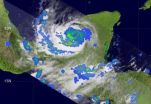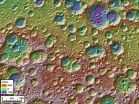Bacteria identified that may lead to inflammatory bowel disease in certain individuals
2010-09-16
(Press-News.org) Certain bacteria that inhabit the intestine provide the environmental trigger that initiates and perpetuates chronic intestinal inflammation in individuals who are genetically susceptible to inflammatory bowel disease (IBD), a study led by Harvard School of Public Health researchers has found.
Inflammatory bowel disease results from a loss of homeostasis, or balance, between the immune system and the microbes that inhabit the intestine. "In this study, we identified two microbes that instigate gut inflammation that leads to inflammatory bowel disease in mice," said lead investigator Wendy Garrett, assistant professor of immunology and infectious diseases at HSPH. "We show using both metagenomic and conventional culture techniques that an individual's genetic background influences what bacteria reside within his or her intestine. Several studies are currently underway examining the intestinal microbial communities of patients with IBD and we are looking forward to exploring the role of the Enterobacteriaceae we have identified in patients with IBD."
The study appears in the September 16, 2010, edition of Cell Host & Microbe.
IBD is a chronic inflammatory disorder that afflicts 1.4 million persons in the US and the incidence is rising around the world. Not only is IBD a devastating and debilitating chronic illness, it is also one of the three highest risk factors for the development of colorectal cancer. There are two principal forms of IBD: Crohn's disease and ulcerative colitis. Approximately 30,000 new IBD cases are diagnosed each year in the U.S.
Whether IBD is caused by individual species of bacteria or disruptions of entire microbial communities remains controversial, said senior author Laurie H. Glimcher, Irene Heinz Given Professor of Immunology at HSPH. "Our findings suggest that answer bridges both hypotheses--specific species of bacteria (Klebsiella pneumoniae and Proteus mirabilis) appear to work in concert with the indigenous gut microbial community to cause IBD."
INFORMATION:
This work was supported by the National Institutes of Health, Danone Research and the Crohn's and Colitis Foundation of America, plus career development awards from the Burroughs Wellcome Fund and the NIH.
"Enterobacteriaceae Act in Concert with the Gut Microbiota to Induce Spontaneous and Maternally Transmitted Colitis," Wendy S. Garrett, Carey A. Gallini, Tanya Yatsunenko, Monia Michaud, Andrea DuBois, Mary L. Delaney, Shivesh Punit, Maria Karlsson, Lynn Bry, Jonathan N. Glickman, Jeffrey I. Gordon, Andrew B. Onderdonk, and Laurie H. Glimcher, Cell Host & Microbe 8, 292�, September 16, 2010.
Visit the HSPH website for the latest news, press releases and multimedia offerings.
Harvard School of Public Health (http://www.hsph.harvard.edu ) is dedicated to advancing the public's health through learning, discovery, and communication. More than 400 faculty members are engaged in teaching and training the 1,000-plus student body in a broad spectrum of disciplines crucial to the health and well being of individuals and populations around the world. Programs and projects range from the molecular biology of AIDS vaccines to the epidemiology of cancer; from risk analysis to violence prevention; from maternal and children's health to quality of care measurement; from health care management to international health and human rights. For more information on the school visit: http://www.hsph.harvard.edu
ELSE PRESS RELEASES FROM THIS DATE:
2010-09-16
SANTA BARBARA, Calif., Sept. 16, 2010 — In the aftermath of the Deepwater Horizon disaster in the Gulf of Mexico, a team of scientists led by UC Santa Barbara's David Valentine and Texas A&M University's John Kessler embarked on a research cruise with an urgent mission: determining the fate and impact of hydrocarbon gases escaping from a deep-water oil spill.
The spill provided a rare opportunity for Valentine, a professor in the Department of Earth Science at UCSB, and Kessler, an assistant professor in the Department of Oceanography at Texas A&M, to study the behavior ...
2010-09-16
La Jolla, CA, September 15, 2010 – Scientists at The Scripps Research Institute have designed a new molecular test that will allow researchers to look for potential drugs targeting a human metabolic enzyme believed to stimulate the appetite and play a role in diabetes.
The new test, which the scientists call a simple assay, will allow researchers to look through hundreds of thousands of compounds for those that have potential to block the action of an enzyme known as ghrelin O-acyltransferase (GOAT). If drugs can be found that safely suppress the action of GOAT, they ...
2010-09-16
PITTSBURGH, Sept. 15 – Fat-derived stem cells can be safely used to aid reconstruction of breast tissue after mastectomy as long as there is no evidence of active cancer, according to researchers at the University of Pittsburgh School of Medicine. Their findings are available in Tissue Engineering Part A.
Plastic surgeons have long moved fat from one part of the body into the breasts for reconstruction, but with some complications and a varying success rate, explained senior author Vera S. Donnenberg, Ph.D., assistant professor of surgery, Pitt School of Medicine. More ...
2010-09-16
Significant weight loss not only improves daily life of morbidly obese woman but also decreases the risk for cardiovascular disease (CVD). However, many people can not lose weight or can not maintain weight loss without help. Bariatric surgery is emerging as a valuable procedure to help morbidly obese individuals lose weight, as studies have shown; it can improve many health profiles and lower mortality. Now, researchers have found another positive impact of significant weight loss after bariatric surgery: it can significantly improve the lipoprotein profiles of women within ...
2010-09-16
NASA's Aqua and TRMM satellites have been watching Karl's clouds and rainfall as he moved across Mexico's Yucatan Peninsula and into the Gulf of Mexico today, powering up into a hurricane.
Infrared imagery of Karl's cloud temperatures from NASA's Atmospheric Infrared Sounder (AIRS) instrument this morning, Sept. 16 at 0753 UTC (3:53 a.m. EDT) showed strong convective activity in his center as indicated by high thunderstorms that were as cold as -63 Fahrenheit. That strong convection was an indication that the warm waters of the Gulf of Mexico were strengthening the storm. ...
2010-09-16
CORVALLIS, Ore. – A new study by an Oregon State University business professor has found that developing countries that adopt major international economic treaties do not necessarily gain more foreign direct investment.
In fact, in some cases adopting these treaties can hurt, not help a developing country, contrary to what agencies such as the World Trade Organization (WTO) espouse. The study, published in the current online version of the Journal of World Business, has major implications for Latin American and Caribbean intellectual policy reform
Ted Khoury, an assistant ...
2010-09-16
GOES-13 satellite imagery this morning showed the "tropical trio": Tropical Storm Karl over the Gulf of Mexico, Hurricane Igor in the central Atlantic, and a waning Hurricane Julia in the eastern Atlantic Ocean. Hurricane Julia has now lost her Category 4 Hurricane status, and is currently a Category 2 hurricane in the eastern Atlantic and weakening. Wind shear, cooler sea surface temperatures and warmer cloud top temperatures all spell a weaker Julia.
The Geostationary Operational Environmental Satellite known as GOES-13 that monitors weather over the U.S. East Coast ...
2010-09-16
ANN ARBOR, Mich.---As another round of talks continues between Israelis and Palestinians, a new University of Michigan study documents the impact the violence has been inflicting on the region's children.
Palestinian and Israeli children not only suffer the direct physical consequences of violence, they are also being psychologically scarred by the high levels of violence they witness, according to the study, presented earlier this summer at the International Society for Research on Aggression.
Nearly 50 percent of Palestinian children between the ages of 11 and 14 ...
2010-09-16
The moon was bombarded by two distinct populations of asteroids or comets in its youth, and its surface is more complex than previously thought, according to new results from NASA's Lunar Reconnaissance Orbiter (LRO) spacecraft featured in three papers appearing in the Sept. 17 issue of Science.
In the first paper, lead author James Head of Brown University in Providence, R.I., describes results obtained from a detailed global topographic map of the moon created using LRO's Lunar Orbiter Laser Altimeter (LOLA). "Our new LRO LOLA dataset shows that the older highland impactor ...
2010-09-16
A multinational team that includes a North Carolina State University researcher has found another piece of the atmospheric puzzle surrounding the effects of aerosol particles on climate change. Their findings will contribute to our ability to more accurately measure human impact on climate, and to determine how much pollution may "mask" the actual rate of climate change.
Dr. Markus Petters, an NC State assistant professor of marine, earth and atmospheric sciences, traveled to the Amazon rainforest in a remote area of Brazil as part of a team that wanted to study how a ...
LAST 30 PRESS RELEASES:
[Press-News.org] Bacteria identified that may lead to inflammatory bowel disease in certain individuals


